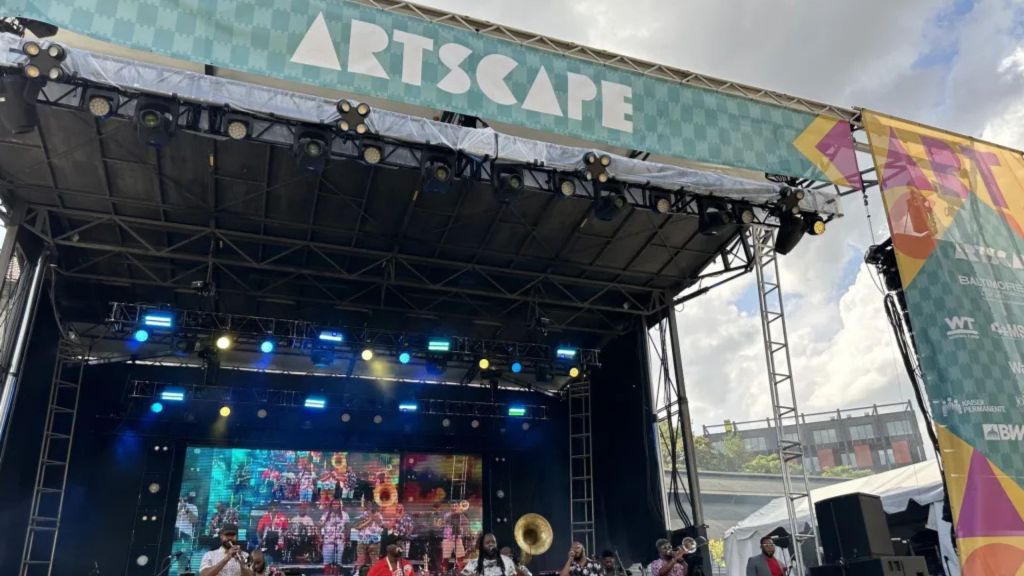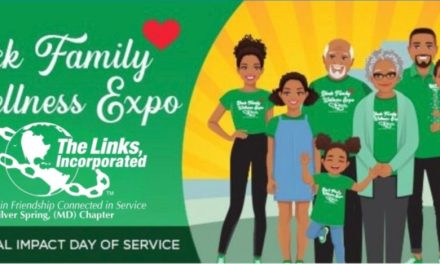By Megan Sayles
AFRO Business Writer
msayles@afro.com
Black artists are feeling uncertain about the future of Baltimore’s art scene following the city’s decision to end its relationship with the Baltimore Office of Promotion and the Arts (BOPA). The organization is responsible for organizing major festivals and initiatives such as Artscape, the country’s largest free arts festival. They also provide substantial support for the local arts scene. The Mayor’s Office sent a letter to the quasi-government agency on Oct. 16, initiating the 90-day termination clause in the city’s contract with the organization.

Photo credit: AFRO Photo / Alexis Taylor
BOPA regularly deploys funding and resources for local creatives and arts and cultural organizations of every genre. It also hosts a variety of free events that enable Baltimoreans to engage and patronize the local arts community. The break-up with Baltimore has raised some concern.
“There are a lot of resources for artists in the city, but BOPA has been around for a long time, providing different needs around public arts grants and festivals,” said Mecca Verdell, a popular author, spoken word poet and actor. “There will definitely be an offset that a lot of artists will feel. We will have to adjust.”
Verdell also condemned public perceptions of BOPA CEO Rachel D. Graham, who only began leading the organization on March 15 after being selected in February.
“I think there’s a narrative spreading that Ms. Graham is being dramatic or angry, which is horrible to label any Black woman,” said Verdell.
The contract termination comes as BOPA continues to navigate a financial crisis. In the letter, Marvin James, chief of staff for Mayor Brandon M. Scott, explained that the organization’s financial instability casted doubt about its ability to meet obligations to the city and local arts community.
“Ending the city’s contractual relationship with BOPA is not a decision taken lightly,” said Scott in a statement. “We are taking this step after deep and careful consideration following several years of turmoil within the organization.”
The end of the contract is subject to approval by the Baltimore City Board of Estimates (BOE). It seems that BOPA’s finances have been on the decline for the last few years. According to federal tax filings, the organization had more than $5.8 million in net assets in 2019. By 2022, after years of canceling events due to the public safety crisis created by the COVID-19 pandemic, that number declined to $1.5 million.
BOPA is responsible for producing events, like the Baltimore Book Festival, fireworks and the Martin Luther King Jr. (MLK) Day parade. In 2023, its former CEO Donna Drew Sawyer stepped down after a public squabble with Scott over the cancellation of the MLK parade. Most recently, its premier event, Artscape, was largely rained out with headline performances canceled on two of three nights.
The organization called two special board meetings in September to discuss its financial standing and devise a path forward. Graham did not confirm or deny whether BOPA had requested a bailout from the city officials when asked by the AFRO about rumors that the organization requested funds from the City.
On Oct. 1 Graham said there was no contention between the Mayor’s Office and the organization.
“There is no dispute,” Graham told the AFRO on Oct. 1. “We’re wholly focused on working with the mayor and the administration on developing a path forward that operates in the best interest of Baltimore artists.”
On the morning of Oct. 16, BOPA’s board voted to layoff employees to address its financial situation.
The AFRO requested additional comments from Graham but was told BOPA is still in the process of preparing a statement.
“We’re grateful that we’ve found a way to address our immediate cash position, and we look forward to bringing resolution to some of the outstanding invoices,” said Andrew Chaveas, interim chair of BOPA board, during the meeting.
BOPA board members also voted to create a transition taskforce to reassess the organization’s contractual relationship with the city. The taskforce, which will comprise BOPA board members, representatives from the Mayor’s Office and community arts advocates, will now be tasked with transferring the organization’s services to the city. It will also help to revamp BOPA’s role and mission and the arts and culture ecosystem in the city.
BOPA will still put on the New Year’s Eve fireworks display and the Martin Luther King Jr. Day parade, as laid out in its contract. If the BOE approves the city’s decision, the organization’s contract will end on Jan. 20.
In the letter, James acknowledged that the termination may cause concern among BOPA’s staff and the city’s arts community, but Scott reaffirmed his commitment to Baltimore creatives.
“Most importantly, it is critical for Baltimore’s arts community to know that this step is being taken to aid support for their critical work in our city,” said Scott in a statement. “We will work diligently to ensure that the events, property management, and, most importantly, direct support for artists and their work is not significantly interrupted. Supporting our artists is critically important, and Baltimore will always do what is right to ensure our artists get the support they need.”
Lanise Stevenson, adjunct professor at Johns Hopkins’ School of Education, said she has mixed feelings about the cancellation of the contract. She is a member of the university’s Inheritance Baltimore project, a joint program and research effort to protect Black archives and curate Black arts and heritage.
“While change can open the door to new opportunities, there is a genuine concern about how this will impact the arts community in Baltimore, especially when accessing free and easily accessible cultural experiences,” said Stevenson.
She believes BOPA has played a critical role in fostering a sense of belonging for people from different neighborhoods, backgrounds and experiences through its events. Without BOPA, Stevenson worries that there will be fewer opportunities for residents to experience the arts in public space, which she believes is crucial to cultivating strong community connections.
Regardless of the contract termination, Stevenson called on the city to preserve and expand the services and support BOPA has provided to artists. She said they must continue the legacy of inclusive, free cultural programming.
“This means continuing to support large-scale events, like Artscape, but also investing in smaller, community-based arts initiatives that are accessible to all neighborhoods in the city,” said Stevenson. “The future of the arts in Baltimore depends on leadership that understands the value of art in creating belonging, healing and economic empowerment.”
The post Local arts community uncertain as Baltimore officials move to terminate BOPA contract appeared first on AFRO American Newspapers.











